Ambassador Ahmed Abu Zaid, official spokesman for the Ministry of Foreign Affairs, guest at the symposium, the Arabic language as a diplomatic tool in a new Arab and international reality
This came in the speech of Ambassador Abu Zeid at the symposium "The Arabic Language... A Diplomatic Tool in a New Arab and International Reality" organized by Ain Shams University as part of the activities celebrating the International Day of the Arabic Language.
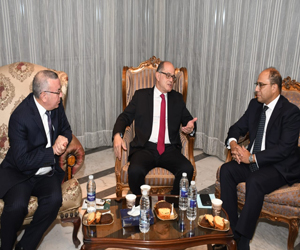 |
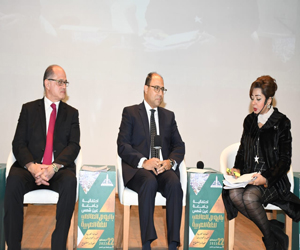 |
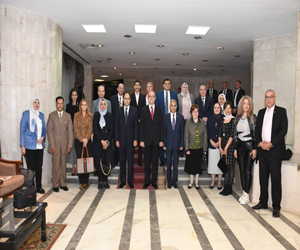 |
||
In the presence of Prof. Dr. Ayman Saleh, Vice President for Postgraduate Studies and Research, Prof. Dr. Ghada Farouk, Acting Vice President for Community Service and Environmental Development, Prof. Dr. Mamdouh El-Damaty, Minister of Antiquities and former Dean of the Faculty of Archeology, Prof. Dr. Jihan Ragab, Advisor to the Vice President for Community Service and Environmental Development, Prof. Dr. Tamer Rady, Advisor to the Vice President for Education and Student Affairs for Activities, Prof. Dr. Amani Hanafi, former dean of the Faculty of Specific Education, Prof. Dr. Yassin El-Shazly, Vice Dean of the Faculty of Law for Postgraduate Studies and Research, and a group of officials, academics, thinkers and media professionals, and the dialogue was moderated by Prof. Asst. Dr. Jihad Mahmoud, Professor of Comparative Literature and Assistant Criticism, at the Faculty of Al-Alsun.
Ambassador Ahmed Abu Zeid pointed to the importance of investing more resources and efforts to preserve the Arabic language as the incubator for a comprehensive concept of Arab national security, stressing that there is a connection between "the Arabic language, culture, and Arab national security."
And the official spokesman, Director of the Public Diplomacy Department, Ambassador Abu Zaid, said that there is no doubt that the Arab region is experiencing a major crisis that has political, developmental, economic, and security dimensions, and there is a decline in the role of the central states at the expense of other entities. There is also a special situation in the Arab world that we are witnessing. Attempts from outside the region to interfere in its affairs and attempts to gain influence within the region and a state of structural weakness in the Arab world require a pause to reflect on the causes of this situation and how to deal with it.
He added that the international system is also going through a new phase of transformation, which is increasing now in light of the Russian-Ukrainian crisis, its effects, and attempts to interfere in the affairs of other regions, all of which require those who live in this region to think about the tools available to them to deal with this reality.
Abu Zeid stressed that the diplomatic tool is the main tool for that, and it is a diverse tool with many elements, including the Arabic language, because our Arabic language was the common denominator that brought Arab countries together, as it is not just a language, but a cultural identity that is always linked to the concept of Arab national security.
He explained that it was necessary to think here about how the Arabic language becomes a tool for strengthening Arab solidarity and a tool for dealing with the outside, whether in terms of communication and coexistence with the other or in terms of preserving your identity in the face of the other.
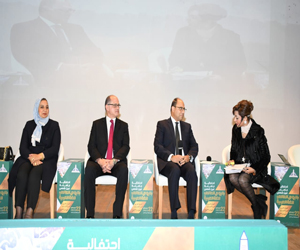 |
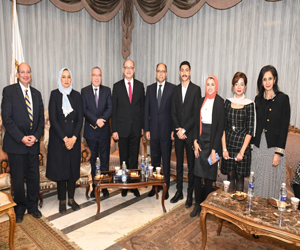 |
|||
Citing Akhbar Al-Balad; Abu Zayd: The Arabic language and supporting its spread are at the core of Egypt's foreign policy.
Ambassador Ahmed Abu Zaid, the official spokesman for the Ministry of Foreign Affairs and Director of the Public Diplomacy Department, affirmed that the Egyptian approach to preserving the Arabic language and supporting its spread comes at the core of Egypt's foreign policy.
Ambassador Ahmed Abu Zeid pointed to the importance of investing more resources and efforts to preserve the Arabic language as the incubator for a comprehensive concept of Arab national security, stressing that there is a connection between "the Arabic language, culture, and Arab national security."
This came in Ambassador Abu Zaid's speech on "The Arabic language... a diplomatic tool in a new Arab and international reality" during the symposium organized last night by Ain Shams University within the framework of the celebration of the International Day of the Arabic Language with the participation of a group of officials, academics, thinkers and media professionals.
And about his vision of the Arabic language as a diplomatic tool… the official spokesman, Ambassador Abu Zaid, explained during the symposium that the Arabic language was associated with a region, identity, and specific culture of countries living in this region, as it goes beyond being a language of communication because it is linked to the historical, political and cultural heritage of the Arab countries and to the Arabic speakers, whether for about 450 million Arabs living in the region, more than fifty million people speak Arabic or people of Arab origin live outside it, and therefore it is a language that has many and varied dimensions.
The official spokesman for the Ministry of Foreign Affairs referred to the characteristics of the Arabic language, which qualifies it to be a diplomatic tool, the first of which is that it is a reflection of the cultural identity of the Arab people.
He referred, for example, to the Egyptian constitution, as it affirms that Egypt is an Arab country whose official language is Arabic, which clearly draws the Egyptian foreign policy line that adopts this approach and thought in the constitution.
The official spokesman added that the Arabic language is also a language of intellectual communication with others, with its culture, civilization, and others, there are vocabularies of the Arabic language present in the national languages of other and neighboring countries, which constitutes a factor of intellectual communication and connection between this region and these countries and makes the Arabic language a tool that can be used to prevent the outbreak of crises and coexistence with the other.
He said that the Arabic language at the same time is a pillar of Arab national security, so we find that the establishment of the Arab League illustrates this, as speaking Arabic was the unifying factor for these countries that founded the University.
Ambassador Ahmed Abu Zaid pointed out that the Arabic language is also a tool for Arab soft power, which is an important diplomatic tool, and the Arabic language as a soft power played a major role in the 14th century, for example, in translating sciences and arts to the West, just as it now plays a role for rapprochement in light of the clash of civilizations. The Arabic language is a factor for solidarity and interdependence within the Arab region, in addition to being a factor for intellectual communication and building bridges.
And about the role of Egyptian diplomacy to benefit from the Arabic language to support the goals of Egyptian and Arab foreign policy. Ambassador Ahmed Abu Zaid said that we find in the directions of Egyptian foreign policy and Egypt's positions in general what confirms that preserving Arab identity and national security is a basic line in Egypt's direction, and he stressed, However, there is a connection between this trio, "the Arabic language, culture, and Arab national security."
He pointed out that Egypt's positions have always been supportive of Arab countries, Arab interests, Arab liberation movements from colonialism, consolidation of the concept of Arab national security, and assistance to Arab countries that were emerging from colonialism at the time to consolidate Arab values and culture at a time when these countries were exposed to severe waves of Westernization and an attempt to obliterate the Arab identity.
He explained that Egyptian foreign policy had a major role in this regard in terms of Egypt's soft power or through Arab schools and support for Arab cultural centers abroad and others to link the Arab communities abroad with the motherland.
He stressed that this Egyptian approach to preserving the Arabic language and supporting its spread comes at the core of Egypt's foreign policy.
In response to a question about his proposed recommendations for the symposium, he said that this is a shared responsibility, whether for the official or private, or academic sectors.
Ambassador Ahmed Abu Zeid recommended investing more efforts and resources to preserve the Arabic language as the incubator for a comprehensive concept of Arab national security.
He also recommended that there be more focus and effort directed to translation so that it serves as a national project for translation to transfer our culture and communicate with others so that there will be a strong push for the concept of translation to protect our interests as Arab countries and break the gap with the other, which will only happen through translation.
He added that there is an urgent need to invest in schools in the Arabic language for our children abroad so that young people can learn our language from them.


.svg)




